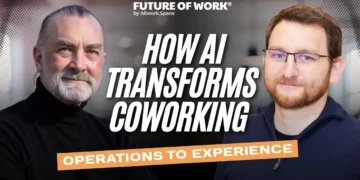As artificial intelligence (AI) software and tools become more advanced, the fear of automation has grown in the workforce. A recent survey conducted by online education platform edX revealed that nearly half of CEOs (49%) believe that AI could replace “most” or “all” of their roles.
The surprising part is that 47% of these CEOs think such a shift might even be beneficial. This data, as highlighted by CNBC, offers a glimpse into the rapidly evolving landscape of the modern workplace and the larger potential impacts of AI on the workforce.
The survey included 1,600 full-time U.S. workers — half of them C-suite executives and CEOs — and revealed a notable contrast in perceptions between top executives and non-executive workers. While CEOs anticipate a transformative role for AI in their positions, only 20% of non-executive workers believe AI could replace a majority or entirety of their jobs, according to CNBC.
Anant Agarwal, edX founder and a professor at MIT, suggests that AI’s potential goes beyond automating mundane tasks. It could revolutionize CEO responsibilities like market data analysis and business operation improvements. However, Agarwal also emphasizes that certain “soft skills” inherent to effective leadership — such as critical thinking, vision, and the ability to inspire — remain challenging for AI to replicate. Thus, while the role of human CEOs might evolve, it’s unlikely to disappear.
This AI-driven skills transformation isn’t limited to the C-suite executives. The survey indicates that by 2025, 49% of the skills present in today’s workforce might become obsolete. Moreover, 47% of workers are reportedly unprepared for this impending shift. As companies increasingly prioritize AI skills, 87% of executives in the survey claimed that they are having difficulties in hiring employees proficient in AI.
Interestingly, the data found that only 24% of workers stated that they are currently upskilling in AI at their jobs. However, a significant 62% of Gen Z respondents said they are actively learning AI skills.
While the full impact of automation remains to be seen, one thing is clear: adaptability and continuous learning will be paramount for success in the evolving job market. As the workforce grapples with these fast-paced changes, the responsibility is on both employers and employees to stay ahead of the curve.



 Dr. Gleb Tsipursky – The Office Whisperer
Dr. Gleb Tsipursky – The Office Whisperer Nirit Cohen – WorkFutures
Nirit Cohen – WorkFutures Angela Howard – Culture Expert
Angela Howard – Culture Expert Drew Jones – Design & Innovation
Drew Jones – Design & Innovation Jonathan Price – CRE & Flex Expert
Jonathan Price – CRE & Flex Expert










